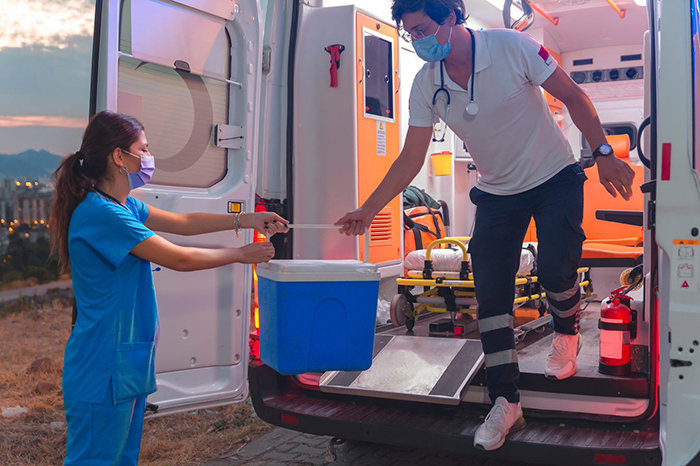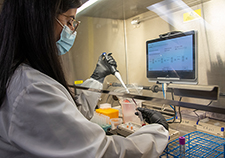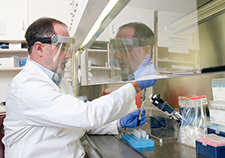Office of Research & Development |
 |


Transplanting organs that carry the hepatitis C virus may help to alleviate a national shortage of donor organs. (Photo for illustrative purposes only. © iStock_aydinmutlu)
August 12, 2021
By Erica Sprey
VA Research Communications
"After careful evaluation of the donor, these organs can be an excellent option for patients."
You've been on the transplant waitlist for five long years because your kidneys have been damaged from disease and no longer work. Perhaps you have a rare blood type, or you've developed antibodies that make it harder to find a suitable organ donor. Some days, you think you will never get a new organ, that you will be on dialysis forever.
Then your transplant surgeon tells you he has found a suitable kidney. However, it carries the hepatitis C virus—a serious contagious disease that will most likely infect you once you are transplanted.
Would you accept the offered organ?
A recent VA Houston study published in Alimentary Pharmacology and Therapeutics found that hepatitis C positive organs are a safe and effective option for most transplant candidates. Newer antiviral drugs have made it possible for patients to be successfully treated for hepatitis C infections transmitted via organ transplant.
Researchers at the Michael E. DeBakey VA Medical Center and Baylor College of Medicine in Houston and the VA Pittsburgh Healthcare System reviewed 35 studies that examined outcomes for 852 solid organ transplants (SOT) in which the donor organs were positive for hepatitis C and the transplant recipients did not have the virus.

AI to Maximize Treatment for Veterans with Head and Neck Cancer

VA researcher works to improve antibiotic prescribing for Veterans

VA’s Million Veteran Program played crucial role in nation’s response to COVID-19 pandemic

VA Further Develops Its Central Biorepository: VA SHIELD
The review included studies that looked at 343 kidney, 233 heart, 204 liver, and 72 lung transplants. Eight to 12 weeks after treatment with drugs called direct-acting antiviral agents (DAAs), 100% of the transplant recipients who were measured for viral load were cured of hepatitis C. Seven transplant recipients relapsed with hepatitis C infection, but all were successfully retreated. No patient deaths or organ graft failures related to hepatitis C infection were reported.
The study team conducted a systematic literature review using the U.S. PubMed and the European EMBASE databases. They reviewed SOT studies, between 2007-2021, that looked at graft survival, patient survival, and patient access to DAAs to treat post-transplant hepatitis C infections.
The studies included both "preemptive" and "reactive" treatment approaches for hepatitis C infection following transplant. Preemptive treatment involves starting the patient on DAAs just prior to or immediately following transplant with a hepatitis C positive organ. The reactive approach waits until the patient shows evidence of hepatitis C infection, through nucleic acid testing (NAT), before initiating treatment.
The study team suggests that using a preemptive approach to treatment is better for patients. "The preemptive approach is clearly preferred as complications were seen in the reactive approach," write the study authors. "However, access to DAA therapy is a major factor when determining which approach is available for patients. Insurance coverage is probably the main hurdle for successful hepatitis C viremic donation."
By not discarding hepatitis C-infected organs outright, surgeons can expand the number of transplant surgeries done each year and help thousands of people who might otherwise die or be removed from the transplant list, while they wait for a suitable organ.
"Some patients can wait years for an organ because they are not that sick," according to medical criteria that are used to rank transplant candidates. "We know that for liver transplants, two out of 10 patients will be dropped from the transplant waiting list because they die from their liver disease or for other reasons," says senior author Dr. Rubin Hernaez, assistant professor at Baylor, and transplant hepatologist at the VA Houston medical center.
There are far more people who need transplants than there are available organs. As of July 30, close to 107,000 people in the U.S. have been listed for an organ transplant, according to the United Network for Organ Sharing or UNOS. Of that number, nearly 65,000 are active transplant candidates. During the period January through July 2021, slightly more than 21,000 transplant surgeries have been completed. That means, for the first six months of the year, only one out of five people in the U.S. have received the lifesaving transplant surgery they so desperately need.
In the past, organs that were positive for hepatitis C were not considered suitable for transplantation. Now surgeons are reconsidering their viewpoint. This shift in thinking is due to the relatively recent arrival of a new class of drugs to treat the hepatitis C virus: pangenotypic direct-acting antiviral agents or DAAs—drugs able to treat all hepatitis C variants.
"Before the advent of DAAs, hepatitis C was very difficult to treat. It had a low chance of cure and high risk for long-term complications, such as cirrhosis of the liver. In fact, to treat the virus, we were giving medications that modulate the immune system—which is a problem in transplantation," says Hernaez.
While the hepatitis C virus was discovered in the late '80s, it wasn't until about six years ago that pangenotypic DAAs were widely available to treat the virus. Before then, medications that treated hepatitis C had more serious side effects and were not as effective—patients typically had high recurrence of infection. Now that DAAs are the treatment standard, there is much less risk to transplant patients who choose to accept an organ that is infected with the hepatitis C virus.
One goal of the Houston study was to disseminate safety and outcomes information on hepatitis C-positive organs to physicians and their patients. "Our study reviews the transplant complications, so that patients can be empowered to make a decision about accepting a hepatitis C-positive organ," says Hernaez. "After careful evaluation of the donor, these organs can be an excellent option for patients. While they may be infected with the virus, we have the treatments to cure the recipients of disease." The researchers recommend that patients be advised on the risks and benefits of using hepatitis C positive organs for transplant, and that patient consent is given prior to surgery.
Hepatitis C is a viral illness that causes liver inflammation and scarring. Untreated, it can lead to cirrhosis, liver failure, liver cancer, and death. Many times, people do not know they are infected with hepatitis C until the disease has significantly damaged their liver. The signs of chronic hepatitis C infection leading to cirrhosis can include fatigue, poor appetite, and yellow discoloration of the eyes and skin. Advanced disease can also cause hepatic encephalopathy—a brain condition that produces confusion and slurred speech.
About 2.7 million people in the United States have hepatitis C.
DAAs have undoubtedly improved the lives of people who become infected with hepatitis C. However, that cure comes with a high cost. The price for these new drugs, with names like Mavyret, Epclusa, and Harvoni, can range from $26,000 to $95,000 for eight to 12 weeks of treatment.
Even if individuals have good health insurance coverage, these drugs must be approved by insurance companies before they can be given to patients. That process can take days to months, according to the study authors—which could jeopardize patient health. The researchers found evidence of DAA treatment delays that ranged from an average of 30 days to, in one case, 169 days. However, there were no reported clinical complications or graft failures related to treatment delays.
In terms of insurance coverage, VA is unique compared to other American hospital systems. The Veterans Health Administration has an active transplant program at 14 locations across the country. Where indicated, VA provides DAAs to infected Veterans at no cost. "We do not have an access problem in VA," notes Hernaez. "If we need to treat a patient who is infected with hepatitis C via transplant, VA will approve the drug. Period."
The study team found it difficult to draw solid conclusions for factors such as insurance approval for DAA treatment, institutional review board (IRB) approval, and the cost of coverage for DAA treatment—if not covered by insurance companies. They did, however, recommend that relevant scientific societies like the American Association for the Study of Liver Disease (AASLD) and the Infectious Diseases Society of American (IDSA) update their guidelines to "approve the use of hepatitis C-positive organs as the new standard of care."
*World Hepatitis Day was observed on July 28. VA has tested more than 85% of eligible Veterans born between 1945-1965. Read about VA's work to offer state-of-the-art care and treatment for Veterans infected with hepatitis C.
VA Research Currents archives || Sign up for VA Research updates